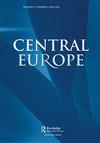斯洛伐克和威尔士的“恳求民族主义”:19世纪的多民族权利
IF 0.1
2区 历史学
Q2 HISTORY
引用次数: 2
摘要
在19世纪,威尔士和斯洛伐克的民族主义者试图通过说服英国和匈牙利领导人自由地授予“从属”民族集体权利来促进国家目标。这种“恳求型”民族主义的策略包括热情洋溢地宣布对共同国家的忠诚,夸大道德优越感,以及对“主导”国家的奉承评论。恳求型民族主义与威尔·基姆利卡(Will Kymlicka)所说的争取“多民族权利”的斗争非常相似,但仍然可以被视为民族主义的一种形式。本文章由计算机程序翻译,如有差异,请以英文原文为准。
‘Supplicant Nationalism’ in Slovakia and Wales: Polyethnic Rights During the Nineteenth Century
ABSTRACT During the nineteenth century, nationalists in Wales and Slovakia attempted to promote national goals by attempting to persuade English and Hungarian leaders to freely grant collective rights to the ‘subordinate’ nation. This strategy of ‘supplicant’ nationalism included effusive declarations of loyalty to the common state, exaggerated claims to moral superiority, and flattering comments about the ‘dominant’ nation. Supplicant nationalism closely resembles what Will Kymlicka called the struggle for ‘polyethnic rights’, but can still be seen as a form of nationalism.
求助全文
通过发布文献求助,成功后即可免费获取论文全文。
去求助
来源期刊

Central Europe
HISTORY-
CiteScore
0.20
自引率
0.00%
发文量
7
期刊介绍:
Central Europe publishes original research articles on the history, languages, literature, political culture, music, arts and society of those lands once part of the Habsburg Monarchy and Poland-Lithuania from the Middle Ages to the present. It also publishes discussion papers, marginalia, book, archive, exhibition, music and film reviews. Central Europe has been established as a refereed journal to foster the worldwide study of the area and to provide a forum for the academic discussion of Central European life and institutions. From time to time an issue will be devoted to a particular theme, based on a selection of papers presented at an international conference or seminar series.
 求助内容:
求助内容: 应助结果提醒方式:
应助结果提醒方式:


